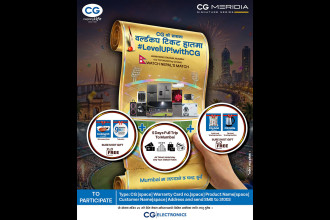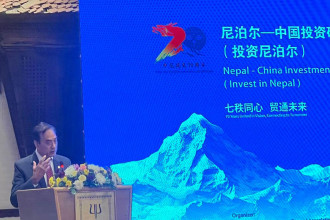-1706871286.jpg)
KATHMANDU: The Friedrich Naumann Foundation for Freedom South Asia and the Centre for Civil Society (CCS) organised a web talk titled ‘Unpacking a Blue Planet Training Manual’, on January 24, 2024.
The talk programme aimed to explore ‘Blue Literacy’ and the interconnectedness of the Blue, Green and Brown aspects of the environment in South Asian nations. The distinguished panellists were Dr Shriji Kurup, Senior Programme Coordinator at Centre for Environment Education, India; Kadambari Lohiya, an education veteran with over 30 years of experience from India; Pavitra Gautam, Chief Executive Officer of Karkhana, Nepal; and Shar Thae Hoy, Founder of Climate Action Lab Myanmar.
The programme was moderated by Rohan Joshi. Joshi introduced Shailendra Sharma from the Government of Delhi and Dr Carsten Klein, Head of the Friedrich Naumann Foundation for Freedom South Asia, the two keynote speakers for the day.
-1706871286.jpg)
Joshi shared that the Blue Planet Training Manual was a training the trainers manual that talks about ecology and economy, and about bringing both together and taking them to the students across the region to schools and students. He emphasized that the most influential people who could take these ideas to the students often are teachers. Ultimately, it is the teachers who are the most critical component of the entire education system. Joshi thanked all the educators and teachers for all the work that they do in disseminating information to the students.
Sharma praised the Friedrich Naumann Foundation for Freedom South Asia and the CCS for launching the ‘Blue Planet Training Manual’ within a month and a half since the initiative was started. He emphasized that the manual is fundamentally important in today’s time, as it connects very effectively with how learners are going to engage with such an important issue. Sharma stressed that in today’s context, everybody is talking about sustainable development and everything we do is seen through the lens of a sustainable model. He added that the manual beautifully covers exploring new areas, which learners need to understand further, such as what is critical to life itself and how we are going to preserve and promote that.
Dr Amit Chandra, CEO of CCS, spoke about how CCS and FNF have been making multiple attempts to look into education and how they can play some role in making things better. He shared that the ultimate goal for all their actions is to have a better quality of education being delivered to the students. Dr Chandra said FNF has been a big support, not just in terms of helping CCS organise things, but also conceptualising, ideating this entire idea. He also extended his gratitude to Dr Klein who keeps the team motivated.
-1706871286.jpg)
The Blue Planet initiative was intentionally started with the conversation about what we could do with climate change, adding that gradually they asked themselves if they could start talking about water – water as a scarce resource and how livelihoods are dependent and affected by water and water resources and what could they do. A video regarding the importance of the Blue Curriculum was then displayed which spoke of how climate change is not any more a threat or a thing of the future, but it’s here and now. The training manual was then officially launched virtually.
Sharma asked Harshit, a student from Hari Vidya Bhawan in Delhi, about his thoughts on the Blue Curriculum being introduced in his school. Harshit spoke about how the environment is an important aspect in everybody’s life and gave an example of how he once plucked a beautiful yellow flower in his village but later realised that if he really did love the flower then he should be actually watering and saving it.
Shar Thae Hoy, an educator and researcher in climate change mitigation and Blue Economy, shared her thoughts on the Blue Curriculum during the panel discussion. She highlighted that people in Myanmar may know about environmental education but they are not familiar with terms like Blue Economy or Green Economy. Hoy revealed that children have been struggling so much for their livelihood that they do not want to learn about the environment. Hence, it is important to make the curriculum engaging, effective, and easy to use. She stressed that the training manual needs to be translated into the local language so that everybody can use it and there should not be much technical jargons. Hoy stated that the Blue Economy and Blue Curriculum are important because we live on land and are disconnected from the ocean and water since we are born. She added that the ocean is diverse, colourful, vast, and provides numerous amounts of natural resources. Many problems are happening in the ocean that we don’t know about, like fishing and plastic pollution problems. Kids need to know that even though the ocean is far away from their homes, it is still an integral part of their lives.
Dr Kurup emphasized the importance of co-creation in learning and how the manual has excellent hands-on activities. He also shared that the ambience must be brought not just in your classroom but also in your home where you can engage your parents too. The activities in the manual are very personalised, he said, adding that it is up to the teacher on how they make it more personalised. Dr Kurup stated that the crux of the whole thing is to empower everyone for sustainability, whether we call it blue, or green, or brown or whatever it is. He also informed that the manual can be customised and that each school will have its own individual manual.
Lohiya applauded the team’s efforts in incorporating the seminar’s discussions into the manual. She mentioned that she was initially unclear about the topics but now understands them after seeing the manual. Lohiya argued that as a teacher, she would find space for the curriculum and suggested co-curricular activities. She praised the relevance of the chosen topics and shared that Delhi has a student-led magazine called E! Magazine that focuses on SDGs. She revealed that students will be preparing their own e-magazines on the topic of SDGs this year and that she is inspired for the next year because she works with e-magazines.
Gautam congratulated the team for their work on the manual and appreciated how it incorporates the principle of water. He emphasised that the curriculum should be dynamic and connected with whatever educators try to do in their classrooms with their students. Gautam highlighted that we are all connected by rivers, glaciers, and weather patterns, and gave an example of how stubble burning in Punjab can create a fog in Kathmandu to demonstrate the interconnected nature. He stressed that learning has to be connected in the same manner, and unless we explore this connectedness, we will not be making our planet any better because the planet by nature is very connected. Gautam found the principle of mimicking nature an interesting one and how nature always has a way of finding the resource from waste.






-1765954041.jpeg)